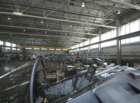Spend now, save later

Rethinking the heating requirements of this hangar at RAF Coltishall has reduced heating costs by 64% and emissions by 55%.
Keith Sprague explains why carefully considering the heating requirements of a building will bring long-term economic benefits.With energy prices tipped to rise by a massive 70% in the next 12 months, the pressure to make savings has never been more urgent. Current industry regulations obviously insist that staff cannot work in cold temperatures, but with factory and warehouse owners faced with an ever increasing overhead, the temptation is to resort to finding the cheapest heating system available — even though it is rarely the most energy efficient. Most manufacturers of heating systems are now looking at whole-life costs as a way of making real energy savings. Short term, a cheap system might seem the right way to go, but do not be deceived. Although paying for more energy-efficient heating systems may not be a popular idea in the current economy, it makes tremendous sense when true value is looked at, rather than initial costs. According to Government information, the most reliable indicator of ‘value’ in the construction industry is the relationship between long-term costs and the benefit achieved by the end-user. Best value from a heating system is gained by achieving the required functionality at lowest cost when calculated over the whole life of the equipment. Whole-life cost analysis is an economic evaluation of the true cost of constructing and running a building over a period of time, based on the functional requirements of the building. It is effective for new buildings, including design-and-build projects, and a pre-requisite for all PFI contracts. Using these calculations, modern manufacturers such as AmbiRad have proved that they can deliver energy savings of up to 70% — a significant reduction in running costs. It is a technique that has been in existence for decades. With more and more people seeing the benefits of whole-life cost analysis, its popularity in construction is increasing. Rather than focusing on the cost of installation and payment for the system, it focuses instead on the building’s requirements, how well each solution tackles them and the costs of doing so. Going cheap might look good in an initial payment. But compare its whole-life cost to that of an energy-efficient system, and the difference is huge amounts of wasted money that businesses cannot afford to lose. When considering each building’s needs, simply specifying that the building must be heated is inadequate, as the full requirements are far more specific. Value management and value engineering are indispensable factors in finding the most efficient solution. The heating system should match the needs of the occupants, as well as the building’s shape and size. This means knowing exactly where and when heat will be needed and how it can best be delivered. In specifying a heating system, it is important to base requirements on output and functional needs, rather than describing the process by which these will be achieved. This allows for flexibility and perhaps more thoughtful or innovative approaches to a heating solution — one that will fulfil needs over the system’s life. For example, it should respond to alterations in the work pattern, downsizing or expansion. An example of the genuine energy saving benefits of this method is RAF Coltishall air base. Whereas it previously had a highly inefficient high-temperature hot-water system, it turned to reducing its extensive fuel consumption. Following an investigation into the options, taking into account whole-life costing, AmbiRad’s radiant-tube heating was found to be the best solution for long-term value. After just a few months of instalment, energy consumption was found to have reduced dramatically. Compared to its previous boiler system, the base saw a 64% reduction in heating costs and a 55% reduction in emissions. For the 10 years following the system’s introduction it has been calculated that the base would get discounted savings of nearly £150 000. This is something that every sector can benefit from. With forward-thinking companies strongly backing the system, there can be UK-wide savings of up to millions of pounds. With fuel prices looking to never back down, it is a saving that no-one can afford not to make.
Keith Sprague is marketing manager with AmbiRad.
Related links:
Related articles:


